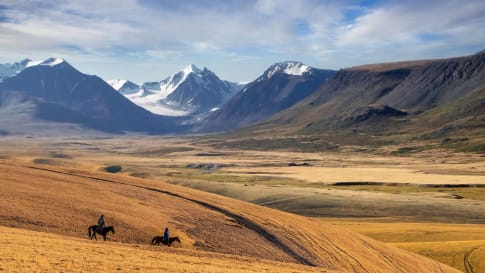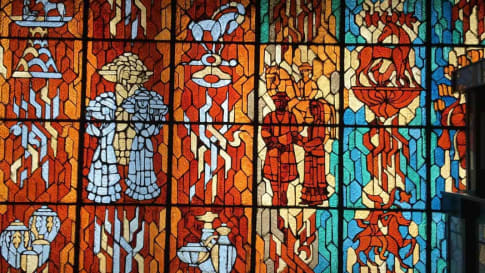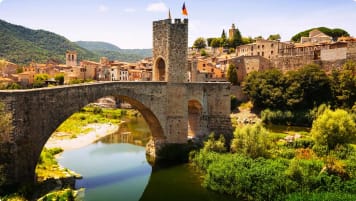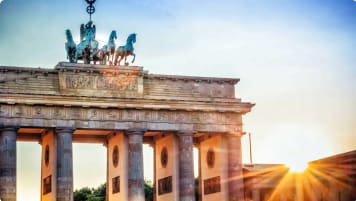Exploring Kazakhstan | Small Group Tour
Visit the largest landlocked country in the world, Kazakhstan. Once part of the Mongol and Russian Empires, Kazakhstan is where man first tamed wild horses on the vast Kazakh Steppe, the dry grassland that dominates its landscape and connects it with Europe and the rest of Asia. A escorted small group tour for mature and senior travellers, couples and solo travellers.
From A$12,995AUD
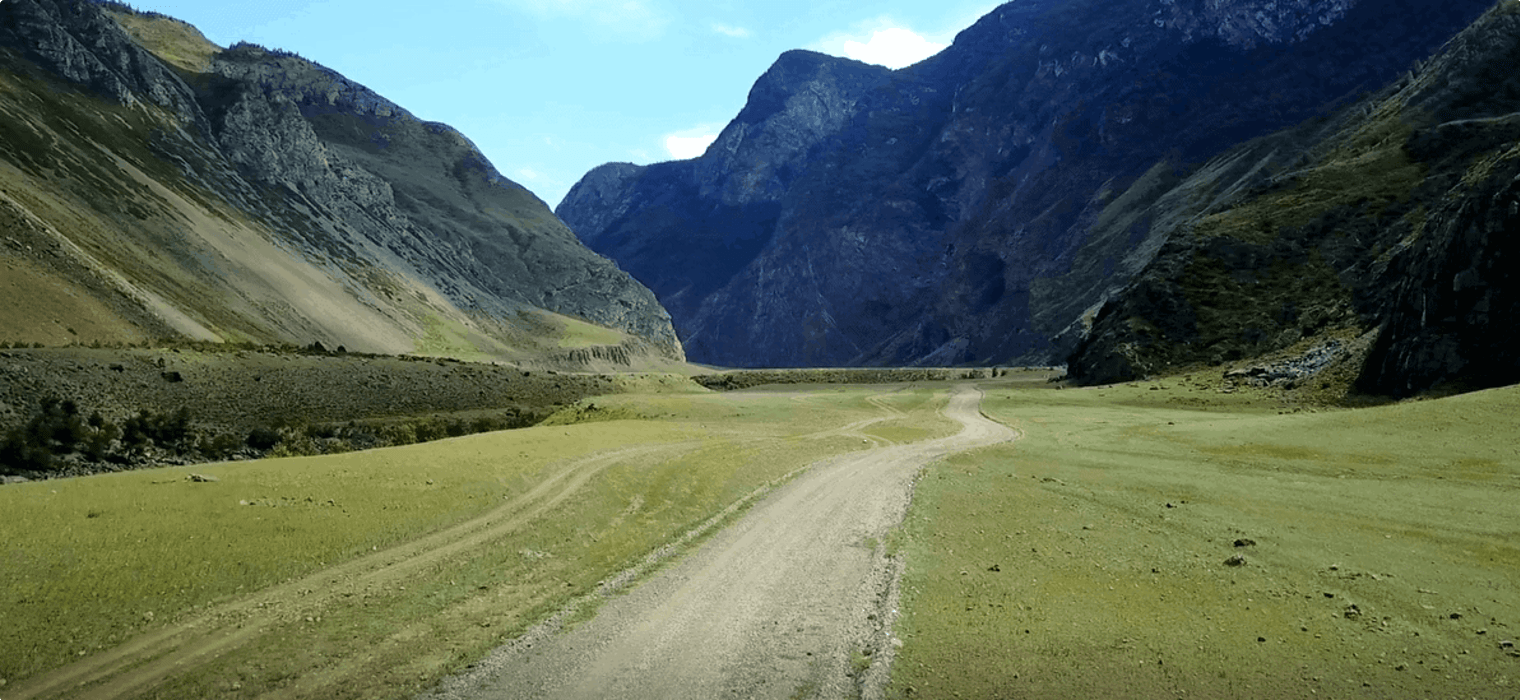
Highlights
- 1. See the crystal-clear waters of the Kolsai Lake System, sitting in the midst of mountain ridges and fir trees.
- 2. Be surprised by the Charyn Canyon, carved by the wind and the Charyn River--a pleasant surprise appearing on Kazakhstan's flat grassland.
- 3. Explore the capital, Nur-Sultan, with its glimmering skyscrapers and daring 21st century architecture.
- 4. Immerse yourself in the rich history and way of life of the sacred region of Ulytau.

Departure Dates
| Departure Date | Price |
|---|---|
| 22 September 2025 Ends 13 October 2025 • 22 days A$12,995 Twin A$14,850 Single Available | Selected |
| 01 June 2026 Ends 22 June 2026 • 22 days A$12,995 Twin A$14,850 Single Available | |
| 21 September 2026 Ends 12 October 2026 • 22 days A$12,995 Twin A$14,850 Single Available | |
| 30 May 2027 Ends 20 June 2027 • 22 days A$13,750 Twin A$15,450 Single Available | |
| 20 September 2027 Ends 11 October 2027 • 22 days A$13,750 Twin A$15,450 Single Available |
Journey through Kazakhstan
Odyssey offers easy, convenient, and relaxed escorted small group tours across Kazakhstan and beyond. We explore Kazakhstan's natural beauty, its ancient heritage, its World Heritage Sites, and cities, all with some truly spectacular scenery along the way. This and more is all waiting to be explored on one of Odyssey’s small group tours of Kazakhstan, designed for the senior traveller, and led by experienced, and enthusiastic like minded people.
Join Odyssey Traveller as we visit the largest landlocked country in the world, Kazakhstan. Once part of the Mongol and Russian Empires, Kazakhstan is where man first tamed wild horses on the vast Kazakh Steppe, the dry grassland that dominates its landscape and connects it with Europe and the rest of Asia. Expect to have your fill of Kazakhstan's rich history and diverse sights in a small group setting, especially designed for active mature and senior travellers. On this tour, we will spend multiple nights in the glittering cities of Nur-Sultan (Kazakhstan's capital, previously called Astana) and Almaty, and explore all the exciting places in between.
Highlights of the tour include:
- Altyn-Emel National Park - a 4,600-kilometre natural reserve, comparable to four times the size of Hong Kong, featuring Bronze Age petroglyphs and a sand dune that “sings”. A safari destination, Altyn-Emel is a good place to spot Kazakhstan's wildlife.
- Kolsai Lake System - Kazakhstan’s most beautiful water formations, sitting in the midst of mountain ridges and fir trees. The lakes are so crystal-clear that they reflect their surroundings like a mirror.
- Charyn Canyon - Carved by the wind and the Charyn River, the canyon is 150 to 300 metres deep and is often compared to the Grand Canyon.
- The National Museum of the Republic of Kazakhstan - housed inside an eye-catching building of blue glass and white marble. The biggest museum in Central Asia, it contains permanent collections telling the narrative of Kazakhstan’s history from ancient to contemporary times.
- “KarLag” (i.e. Karaganda Corrective Labour Camp) - one of the largest labour camps organised by Joseph Stalin, now a memorial to the victims and a reminder of the country's politically repressive past
- Ulytau - "the great mountains" believed to be the capital of the Golden Horde, one of the territories of the Mongol Empire; and the ancient capital of the Kazakh khanate.
For more details, click the ‘Top 5’ or ‘Itinerary’ buttons above! If you’re keen to experience this tour, please call or send an email. Or, to book, simply fill in the form on the right-hand side of this page.
Odyssey Traveller regularly offers tours designed for the active senior or mature traveller to enjoy in a small group holiday and learning environment. We also publish articles to provide more information to our loyal and prospective participants. Check out this article for a brief overview of Kazakhstan's history and must-see sites, or visit the country profile of Kazakhstan.
Other articles of possible interest is this two-part post filled with travelling tips for seniors, an article on the many nifty gizmos and gadgets you can bring on your trips, and an important article about practising responsible travel.
If you want to go beyond Kazakhstan and explore the rest of the Central Asian countries, consider signing up for Odyssey Traveller's Uzbekistan, Kazakhstan, Kyrgyzstan, and Turkmenistan tour and Silk Road tour.
Gallery
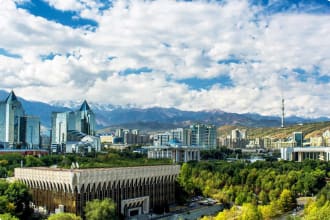

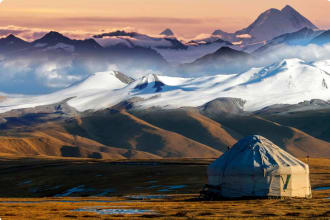
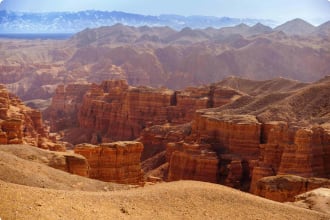
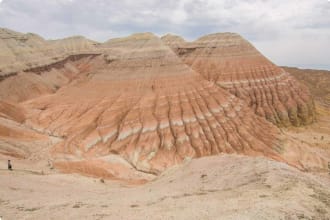
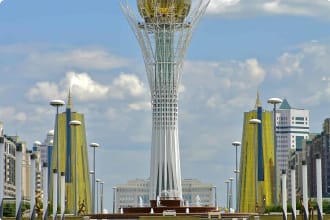
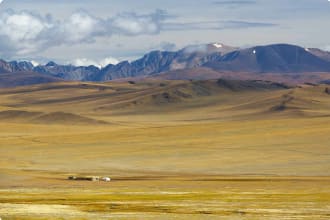
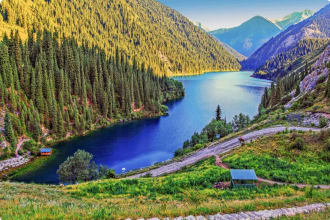

Itinerary
22 days
Day 1: Nur-Sultan (formerly Astana)
Accommodation: Hampton by Hilton or similar
On arrival in Nur-Sultan (formerly Astana), we make our own way to our hotel.
Nur-Sultan (formerly Astana), the capital city of Kazakhstan, was originally founded in the 1820s as a Russian military outpost. It became an oblast (province) centre in 1939, when Kazakhstan became a constituent republic of the Soviet Union. In the early 1950s, Nikita Khrushchev launched a campaign to develop Kazakhstan’s “virgin lands”, and millions of Russians moved to the region and into this city, then known as Tselinograd, or “City of the Virgin Lands”. It was named Aqmola (“White Grave”) following Kazakhstan’s independence in 1992. Five years later, the country’s capital was moved from Almaty to Aqmola, which was renamed Astana in 1998. Astana simply means “capital”. On March 23, 2019, its capital Astana was formally renamed to Nur-Sultan to honour its longtime leader Nursultan Nazarbayev, who has resigned that month.
In the evening, we meet for a welcome dinner and orientation.
Day 2: Nur-Sultan (formerly Astana)
Accommodation: Hampton by Hilton or similar
Kazakhstan’s government tapped the country’s vast profits from its oil and gas reserves in order to design and expand Astana. This city, with its skyscrapers and 21st century architecture, appears shimmering in the midst of Kazakhstan’s flat grasslands.
Today we will go on a walking tour starting from the old part of the city on the right side of the Ishim River, a river which Kazakhstan shares with Russia. Among those we will see are the Kulyash Baiseitova National Opera and Ballet Theatre which was inaugurated in 2000 and named after a Soviet Kazakh opera singer; the Museum of Saken Seifullin, dedicated to the Kazakh poet; and the mansion of the merchant Vasily Kubrin. The Kubrin family has strong business and political roots in Nur-Sultan.
Day 3: Nur-Sultan (formerly Astana)
Accommodation: Hampton by Hilton or similar
We continue our tour of Nur-Sultan and walk along the riverside to see the city’s most important architectural buildings and monuments. We will see Constitution Square, where the President of Kazakhstan, Nursultan Nazarbayev, announced the capital’s move from Almaty to Nur-Sultan; the Museum of the First President of the Republic of Kazakhstan, housed in the former presidential palace and containing exhibits dedicated to Nazarbayev, who has served as Kazakhstan’s president since the office was founded in 1990; and Nur-Sultan’s Congress Hall.
The Bayterek Tower is also popular among travellers; it stands 97 metres tall to commemorate the year 1997, which was when the capital of the country was moved from Almaty to Nur-Sultan. The tower is topped by a golden egg symbolising new life, and which also serves as an observation deck offering a view of the city.
In the afternoon, we will visit the National Museum, housed inside an eye-catching building of blue glass and white marble. The biggest museum in Central Asia, it contains permanent collections telling the narrative of Kazakhstan’s history from ancient to contemporary times. Perhaps the most famous is the “Golden Warrior” or the “Golden Man”, a statue of a Scythian warrior wearing a gold-plated uniform and carrying a gold dagger and sword, and which now serves as a national icon of Kazakhstan.
We will also visit the triangular Palace of Peace and Reconciliation, conceived as a permanent venue of the triennial Congress of Leaders of World and Traditional Religions that champions religious understanding, peace, and unity. The pyramid, designed by British architect Lord Norman Foster, has an opera hall and conference, educational facilities, and a national centre.
Day 4: Nur-Sultan - Burabay
Accommodation: Okzhetpes Sanatorium and Spa or similar
After breakfast, we will travel to Burabay, 250 kilometres from Nur-Sultan, and explore the Burabay National Park, which has diverse flora and abundant fauna, including several species of deers and birds.
We will then transfer to the famous Ablai Khan meadow, named after one of the legendary leaders of the Middle Horde (Middle Zhuzes) formed in Kazakhstan in the early 17th century. The meadow is said to have a unique and rejuvenating microclimate. In the meadow, situated in the foothills of Kokshe Mountain, is a natural rock formation shaped like a throne, said to be used in early Kazakh coronation ceremonies.
We will view another natural formation, the Zhumbaktas (“Mysterious Stone”) located in the middle of a beautiful gulf in Burabay Lake, which looks like the profile of a young girl. Near Zhumbaktas is Okzhetpes Rock (“an arrow cannot reach”). According to legend, a captive girl climbed the rock and promised to marry the person whose arrow would reach the top. Since none of the arrows could reach it (hence the name), and not wanting to continue being a slave or being forced to marry, the girl jumped off this rock and turned into the Zhumbaktas rock in Burabay Lake.
Day 5: Burabay - Karaganda
Accommodation: Chaika or similar
We will be up early today to transfer to Karaganda, a journey which will take roughly six hours. We will have breaks along the way, and have lunch upon arrival.
Karaganda (or Qaraghandy) derives its name from the caragana bush. We will learn more about this city in a short tour. Among the monuments we will visit is the Miner’s Glory, erected in 1974 and depicting miners cast in bronze. Karaganda was settled in the late 1850s and became a major coal-mining area during the days of the Soviet Union. Coal mining and the production of coal-mining machinery is still a big part of Karaganda’s industry.
Day 6: Karaganda
Accommodation: Chaika or similar
We will continue our tour of Karaganda after breakfast by visiting the Karaganda Museum of Fine Arts, the Museum of Anatomical Karaganda Medical Academy, the Botanical Garden, and the Regional Museum.
Karaganda’s Mine Museum offers insight into the history of coal-mining in Karaganda, which will complement the tours to the other museums. Here you will find out how coal deposits were discovered in this region and when and how the first mines were established. This is a unique place to get a real-life experience of a coal mine.
After lunch, we head to the old “KarLag” (i.e. Karaganda Corrective Labour Camp) headquarters, one of the largest labour camps organised by Joseph Stalin, now a memorial to the victims and a reminder of the country’s politically repressive past.
Thirty-five kilometres south of Karaganda is Spassk, where World War II prisoners of war were kept. The camp no longer exists, save for the ensemble of memorial stones erected by several nations to honour and remember their fallen citizens.
Day 7: Karaganda - Kyzylarai
Accommodation: Shabanbai-Bi village guesthouse
From Karaganda, we will transfer to the village of Shabanbai-Bi, a travel time of 4 1/2 hours. Shabanbai-Bi is located at the foot of the Aksoran, the highest peak of the Kyzylarai mountains. The Kyzylarai is home to the argali (Ovis ammon), the largest living wild sheep.
The main thrust of the village is ecotourism, or nature-based tourism. We will be housed in a typical Kazakh family guesthouse to learn more about their traditions and way of life.
After lunch, we will transfer to the village of Akshkol (30 minutes). We will view the UNESCO World Heritage-listed 12th century Megalithic mausolea of the Begazy-Dandybai culture, which developed its own specific characteristics due to the settlement’s isolated location in a mountainous region.
We will then return to Shabanbai-Bi for dinner and rest.
Day 8: Kyzylarai - Karaganda
Today we will visit the Aulie Cave and view the Aksoran. Those who are physically able can hike to the peak. We will also view mausoleums dating back to the Kazakh-Dzungar wars. The Dzungar Khanate was the last major nomadic empire left from the Mongol Empire.
We return to Shabanbai-Bi village and travel on to Karaganda.
Day 9: Karaganda - Ulytau
Accommodation: Ulytau village guesthouse
Today we will be going on a drive from Karaganda to Ulytau, with a stop for lunch at Zhezkazgan. Zhezkazgan is a small city in Central Kazakhstan which during the Soviet era was the site of a Gulag labour camp. The city was created in 1938 and its industry is built on copper mining. The Russian spaceport Baikonur Cosmodrome is located 400 kilometres outside the city. As of 2018, it remains the only launch complex left for flights to the International Space Station. Zhezkazgan itself has space-related monuments, such as the Stella Kosmos and the Monument to the Conquerors of Space.
From Zhezkazgan we will drive to Ulytau. Ulytau means “the great mountains” and is believed to be the capital of the Golden Horde (one of the territories of the Mongol Empire when it split into four in the 13th century) and the ancient capital of the Kazakh khanate. We will visit the mausoleum of Alash-khan (85 km, 1.5 hours), legendary ancestor of the Kazakh people, and the mausoleum of Zhoshy Khan (20 km, 30 min), Genghis Khan’s eldest son and who was said to be the ancestor of Kazakh’s rulers. We will stay overnight in a guesthouse in the village.
Day 10: Ulytau
Accommodation: Ulytau village guesthouse
Today after breakfast we will be hiking up the highest point of the mountain (Auliye-tau; Ulytau, 1133 metres), considered a sacred space which people visit for its healing properties. Pilgrims come not only from Kazakhstan but even from the neighbouring countries of Russia, Uzbekistan, and Kyrgyzstan. We will also look at the seven ancient tombs of the Sufis before returning to the village.
We break for lunch. We will travel to Altynshoky Hill (55 km., 1.5 hours) still in the Ulytau mountain range, and climb the hill where there is a copy of the inscription made by order of Timur (Tamerlane) in his campaign against the Golden Horde, and the remnants of the smelting furnace used to make the inscription.
We will then drive to Baytleu (49 km., 2 hours) where we will rest in a village guesthouse.
Day 11: Ulytau - Karaganda
Accommodation: Chaika or similar
Today we will visit the The Monument of Unity of Kazakhstan’s People, erected in Ulytau in recognition of its sacredness to the Kazakh people and its importance in Kazakh history. We will then drive to Baskamyr (60 km., 50 minutes) and tour the settlements from the 8th to 12th centuries, and the archaeological digs uncovering settlements dating back to the Bronze Age. We will move to the village of Zhezdy (15 km., 25 minutes) and visit a historical museum of mining and metallurgical history. From Zhezdy, we transfer to Zhezkazgan (60 km., 40 minutes) where we will dine in a local cafe.
We will catch a train to travel overnight back to the city of Karaganda.
Day 12: Almaty
Accommodation: Novotel or similar
We arrive in Karaganda in the morning and have breakfast, freshen up, and pack up for our flight to Almaty in the afternoon.
Almaty is Kazakhstan’s largest city and its main transport hub and centre of industry and education. It served as capital of the former Kazakh Soviet Socialist Republic (1929–91) and of independent Kazakhstan (1991–97) before the capital was moved to Nur-Sultan. Almaty means “Father of Apples” due to the abundance of apple trees in the region.
Upon arrival in Almaty, we will transfer to our hotel and rest.
Day 13: Almaty
Accommodation: Novotel or similar
After breakfast, we will meet with our local guide at the hotel lobby for the start of our city tour. Today we will visit the Green Bazaar where we could taste local cuisine and take part in (or simply watch) the cooking and preparation of national delicacies. We will visit monuments such as the Park of 28 Panfilov Guardsmen, named after General Ivan Panfilov who led 28 soldiers who stopped the offensive of Nazi German tanks in Moscow during World War II; the Ascension Cathedral, built by architect Andrei Zenkov, famous as a founder of earthquake-proof construction; and the Kazakh Museum of Folk Musical Instruments showcasing traditional musical instruments from Kazakh culture, as well as instruments of Turkish, Uzbek, and Kyrgyz origins.
We will have lunch with a Kazakh family in order to sample authentic Kazakh cuisine and learn some of Kazakh traditions.
In the afternoon, we continue our sightseeing and visit the Central Mosque constructed in the Timurid style of architecture. We will watch a folk show at Gakku Restaurant, and continue on to Republic Square, the heart of Almaty, where the main festivities, events and demonstrations are held, and the Central State Museum of Kazakhstan, established in 1931, one of the oldest and largest museums of Central Asia.
We will head to the Sunkar Falconry Centre for Golden Eagle Show to see several species of eagles and other birds of prey and learn more about this bird sanctuary.
We will continue the tour with a visit to Kok-Tobe Hill (“Green Hill”), the highest point in the city, located at a height of 1100 meters above sea level. We will have dinner and enjoy an amazing view of Almaty city at sunset.
Day 14: Almaty
Accommodation: Novotel or similar
Following an early breakfast we will drive to Tamgaly-Tas, a canyon around the lush Tamgaly Gorge featuring a remarkable concentration of 5,000 rock carvings (petroglyphs) made by inhabitants of human settlements from the Bronze Age to the Medieval era. It is on the list of UNESCO’s World Heritage Sites.
After exploring this area, we will transfer to Camel Farm (approx. 115 km). On the way we will stop to view the film set of Nomad, Kazakhstan’s lavishly funded historical epic.
We will have lunch at the Camel Farm, which is the largest camel farm in Kazakhstan. We will enjoy our meal in a Kazakh nomadic hut called a yurt or yurta (Russian term) and learn more about camel breeding. We also have the option of feeding camels by hand or taking a camel ride around the farm.
Day 15: Almaty
Accommodation: Novotel or similar
Today is a free day to be spent at our leisure.
Day 16: Almaty
Accommodation: Altyn-Emel guesthouse
Today we will journey to the 4,600-kilometre Altyn-Emel National Park. Created in 1996, it is Kazakhstan’s largest natural reserve, comparable to four times the size of Hong Kong. The park is home to the Terekty Petroglyphs, which dates back to the Bronze Age, the stone carvings depicting the hunts, rituals, worship, and animals of the ancient nomads, as well as the Besshatyr burial mounds and the vertical Oshaktas, which were either used as a place to put giant cauldrons to feed Genghis Khan’s army, or a signal tower to warn them against enemy forces.
A popular stop is the sand dune that “sings”, emitting a low rumble like an aircraft engine when the wind blows. A safari destination, Altyn-Emel is a good place to spot wildlife, such as the rare goitred gazelle (zheyran), argali sheep, wild ass (kulan), and Tian Shan brown bear.
Day 17: Almaty
Accommodation: Kolsai guesthouse
Today we will be travelling to the Kolsai Lakes. The Kolsai Lake System is made up of Kazakhstan’s most beautiful water formations, sitting in the midst of mountain ridges and fir trees. The lakes are so crystal-clear that they reflect their surroundings like a mirror.
Along the way we will stop at Dungan Mosque, a colourful house of worship built in 1910 by the Dungans, Chinese Muslims who fled persecution in China in the 1800s. We will also stop at the Charyn Canyon. Carved by the wind and the Charyn River (also spelled Sharyn River), the canyon is 150 to 300 metres deep and is often compared to the Grand Canyon, carved by the Colorado River. Charyn Canyon’s colourful rock formations resemble sculptures and buildings, though all are naturally carved by the water.
Day 18: Almaty
Accommodation: Novotel or similar
The Kolsai Lakes are made up of three alpine lakes. Today we will have a walking excursion to picture-perfect Kolsai 1, a highlight of the Almaty region.
Day 19: Almaty - Turkestan
Today we will drive to the yurt-dotted Assy Plateau where Kazakh farmers graze their livestock. We will also follow the walking trail to the Turgen Waterfalls before heading back to Almaty and catching the train to Turkestan.
Day 20: Turkestan - Shmykent
Accommodation: Shymkent Hotel
Upon arrival in the city of Turkestan we will transfer to our hotel. Following breakfast, we will go on an excursion to the Mausoleum of Khoja Ahmed Yaswi, built for a 12th century Sufi master and an incredible example of the art and architecture style that flourished during the rule of Timur, first ruler and founder of the Timurid Empire.
We will transfer to Shymkent (170 km.) and along the way we will see the museum in Shaulder; the ruins of Otrar, once a thriving oasis city on the Silk Road; and the Arystan Baba mausoleum, built over the tomb of the 12th century mystic and a place of pilgrimage.
Shymkent is the third most populous city in Kazakhstan, behind Almaty and Nur-Sultan. It was a caravanserai (roadside inn) during the days of the Silk Road, and is a major junction on the Turkestan-Siberia railway.
Day 21: Shymkent
Accommodation: Shymkent Hotel
Today we will be visiting the Kazygurt Holy Mountain on the western ridge of the Tian-Shan Mountains. This place is rich in spiritual stories and fantastic legends; one of which says that this is where Noah’s Ark landed after the Great Flood.
We will then go on a trek to the Zhylak ata waterfall. After lunch, we will head out of town to observe shamans performing their rituals. In the evening we return to Shymkent for dinner and an overnight stay.
Day 22: Shymkent to Almaty
Accommodation: Novotel or similar
After breakfast, we will transfer to the airport for our flight to Almaty. We will have a short tour in a museum in the morning (to be confirmed) and have the rest of the day free to spend at our leisure.
In the evening, we meet again as a group for our farewell dinner.
Day 23: Almaty
Our tour and our services end after breakfast.
Includes / Excludes
What’s included in our Tour
- 22 nights of accommodation.
- Full board while on tour (starting with dinner on Day 1)
- Services of an Odyssey Tour Leader.
- All internal flights and taxes (15kg luggage allowance)
- Applicable entry fees and services of local guides.
- Service charges and gratuities.
- Detailed tour information booklet.
What’s not included in our Tour
- Comprehensive travel insurance.
- International return airfares including taxes.
- Items of a personal nature.
- Visas for entry.
Participants must be able to carry their own luggage, climb and descend stairs, be in good health, mobile and able to participate in 3-5 hours of physical activity per day, the equivalent of walking / hiking up to 8 kilometers per day on uneven ground.
Book now
Make it a private tour
Easing your journey
Crossing international borders with restrictions
The list of requirements to travel internationally has changed and will continue to change for several years. Odyssey is here to assist you in managing your way through these requirements:
For more information see our Crossing international borders with restrictions page.
Book With Confidence
If less than 30 days before your tour starts you are unable to travel as a result of Government travel restrictions, Odyssey Traveller will assist you with a date change, provide you with a credit or process a refund for your booking less any non-recoverable costs.
See Terms and conditions for details.
Peace of Mind Travel
The safety of our travellers, tour leader, local guide and support staff has always been our top priority and with the new guidelines for public health and safety for keeping safe for destinations around the world, we’ve developed our plan to give you peace of mind when travelling with us.
See Peace of Mind Travel for details.
Reading List Download PDF
An Illustrated History of Kazakhstan: Asia's Heartland in Context
Jeremy Tredinnick
This lavishly illustrated book reveals the full history of the heart of Central Asia across the ages, focusing on the region that is modern-day Kazakhstan. Using essays from renowned archaeologists, historians and scholars as the core of each chapter, this book explains Kazakhstan s long and complex history. This flowing narrative is complemented by a range of beautiful maps and images, from exquisite museum pieces to landscapes that place you within the hauntingly beautiful environment that moulded the region s rich social fabric. The reader is taken on a fascinating journey, from pre-history when changing climate and habitats opened up new areas to human migration, through the globally significant era of the warrior nomads and city-states along the trading routes between East and West, to the colonization of Central Asia by Imperial Russia and the chaos of the Soviet period. Independence for the Central Asian states has seen Kazakhstan take a leading role in the region, and the exciting prospects of this modern state suggest a future as rich and engaging as its past.
In Search of Kazakhstan: The Land that Disappeared
Christopher Robbins
The only thing most people know about Kazakhstan is that it is homeland to Borat - and he isn't even real. Actually this vast place - the last unknown inhabited country in the world - is far more surprising and entertaining. For one thing, it is as varied as Europe, combining stupendous wealth, grinding poverty, exotic traditions and a mad dash for modernity.
Silent Steppe: The Memoir of a Kazakh Nomad Under Stalin
Mukhamet Shayakhmetov (Author) and Jan Butler (Translator)
Documents the tragic story of the Kazakh nomads of central Asia under Stalin's regime, offering insight into the culture's Islamic and pagan heritage, the ancient traditions that established their nomadic way of life, and the author's family's struggle to relocate and survive after his father was fatally incarcerated within a prison camp.
Once in Kazakhstan: The Snow Leopard Emerges
Keith Rosten
Soon after the disintegration of the Soviet Union, Keith Rosten leaves the United States to be a Fulbright Lecturer in newly-independent Kazakhstan. In Once in Kazakhstan, Rosten draws a sometimes humorous portrait of a critical period in the emergence of this Central Asian country, interweaving the challenges and exhilaration of living in Kazakhstan with the historical backdrop of a nation grappling with its independence.From horse heads in the Central Market, to guns on the ski slopes, and to the first-ever parliamentary elections, Rosten takes you on a whirlwind tour of the country. He vividly recounts the change in currency from the Soviet ruble to the tenge and travels with a candidate for parliament to a rural village near Semipalatinsk. Using his knowledge of local language and customs, Rosten provides access to native sources on the history, politics, traditions,and spirit of Kazakhstan. Complete with photographs of the people, places, and monuments of the country, Once in Kazakhstan is an invaluable resource for anyone who is interested in learning more about, or traveling to, the fascinating landscape of this emerging nation.
Inside Central Asia: A Political and Cultural History of Uzbekistan, Turkmenistan, Kazakhstan, Kyrgyz stan, Tajikistan, Turkey, and Iran
Dilip Hiro
The former Soviet republics of Central Asia comprise a sprawling, politically pivotal, densely populated, and richly cultured area of the world.
In this comprehensive new treatment, renowned political writer and historian Dilip Hiro places the politics, peoples, and cultural background of this critical region firmly into the context of current international focus.
"For those who still get their "-stans" mixed up, Hiro's book provides a detailed and nuanced overview of the region of central Asia. He explains the ethnic tensions, religious intolerance and struggle for political identity in the lands caught between two behemoths the splintered Soviet empire and the rising Chinese one."
-Financial Times, Best Books of 2009
"Readers acquainted with Mr.Hiro's prolific writing about Asia and the Islamic world will be unsurprised to learn that Inside Central Asia is a conscientious guide to the region, full of dependable history-telling and analysis."
-The Economist
"Hiro's account provides a fast-moving and well-sourced genealogy of the Central Asian republics' political and economic trajectories, focusing on the post-Stalinist period up to the present day. It is unlikely that more comprehensive analysis of this period in Central Asia has been written, and it serves as a valuable update to Hiro¦s earlier Between Marx and Muhammad: the Changing Face of Central Asia."
-Issac Scarborough, n+1
The Great Game: The Struggle for Empire in Central Asia
Peter Hopkirk
Peter Hopkirk's spellbinding account of the great imperial struggle for supremacy in Central Asoa has been hailed as essential reading with that era's legacy playing itself out today.
The Great Game between Victorian Britain and Tsarist Russia was fought across desolate terrain from the Caucasus to China, over the lonely passes of the Parmirs and Karakorams, in the blazing Kerman and Helmund deserts, and through the caravan towns of the old Silk Road-both powers scrambling to control access to the riches of India and the East. When play first began, the frontiers of Russia and British India lay 2000 miles apart; by the end, this distance had shrunk to twenty miles at some points. Now, in the vacuum left by the disintegration of the Soviet Union, there is once again talk of Russian soldiers "dipping their toes in the Indian Ocean."
The Washington Post has said that "every story Peter Hopkirk touches is totally engrossing." In this gripping narrative he recounts a breathtaking tale of espionage and treachery through the actual experiences of its colorful characters. Based on meticulous scholarship and on-the-spot research, this is the history at the core of today's geopolitics.

